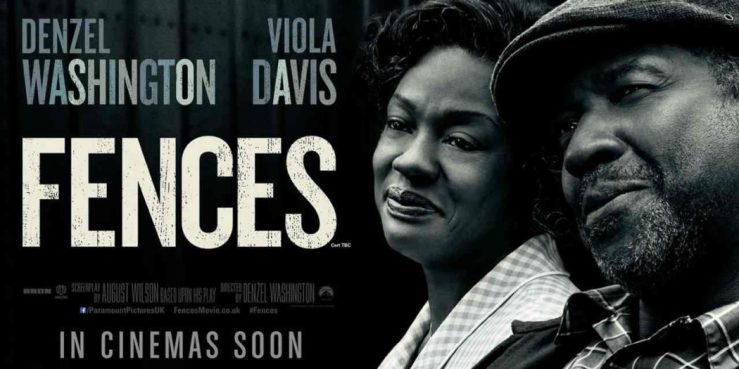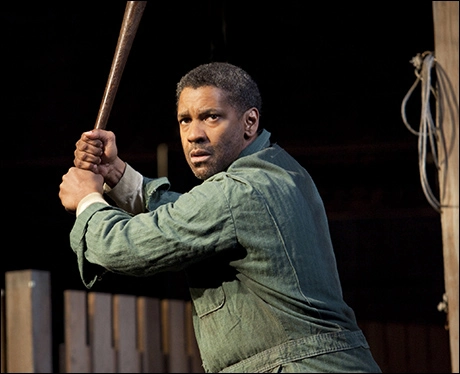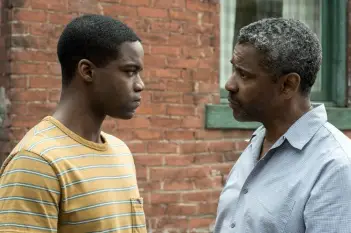
“That’s strike one. See, you in the batter’s box now. You swung and you missed. That’s strike one. Don’t you strike out!”
 The baseball metaphor, the whole concept of ‘three strikes and you’re out’, is tried and true as a cultural idiom. In Denzel Washington’s latest directorial effort, his first in nine years and an adaptation of a Pulitzer Prize winning August Wilson play(Washington also plans to executive-produce the rest of the author’s ten play Pittsburgh Cycle), Fences, that metaphor is employed as a shallow, subjective assessment of a simple life.
The baseball metaphor, the whole concept of ‘three strikes and you’re out’, is tried and true as a cultural idiom. In Denzel Washington’s latest directorial effort, his first in nine years and an adaptation of a Pulitzer Prize winning August Wilson play(Washington also plans to executive-produce the rest of the author’s ten play Pittsburgh Cycle), Fences, that metaphor is employed as a shallow, subjective assessment of a simple life.
Troy Maxon(Washington) is a garbage collector who bases his entire life around the idea that he almost made it in baseball. He’s arrogant and boorish, drinking straight from the bottle, filling every conversation with an influx of his own words. The title of the play comes from his promise to build his wife, Rose(Viola Davis), a fence around their property — something that he puts off further and further into the future. He plans and he talks, but he never does anything. He tosses his anger and frustration and bitter disappointment all around him, throwing around his cold assessment of reality especially where it relates to his youngest son, Cory: “what law is there say I got to like you?”
It’s difficult to fully comprehend a film with a black cast and a historical setting without acknowledging the racial component of the story. It’s the cold, rejecting world of the 1950s, where the mere fact that Troy is able to have himself promoted to a driver of a garbage truck rather than a lifter of garbage cans is viewed as at least a small racial victory.
 The world kicks and beats Troy down, so he finds a place to kick and beat down his own. Rose is his wife, and as such she is his simple support, always lingering in the background. Where his son Cory tries to make it playing football, his father shoves his own ideals down his throat: “The white man ain’t gonna let him get nowhere with that football. I told him when he first come to me with it. Now you come telling me he done went and got more tied up in it. He ought to go and get recruited in how to fix cars or something where he can make a living.”
The world kicks and beats Troy down, so he finds a place to kick and beat down his own. Rose is his wife, and as such she is his simple support, always lingering in the background. Where his son Cory tries to make it playing football, his father shoves his own ideals down his throat: “The white man ain’t gonna let him get nowhere with that football. I told him when he first come to me with it. Now you come telling me he done went and got more tied up in it. He ought to go and get recruited in how to fix cars or something where he can make a living.”
The brief, tenuous control that Troy has is what he feels he most desperately needs to hold onto. By subjecting his wife to his whims and by exerting an influence of power over his son, he creates a universe subjective to his framing understanding of baseball. Where Cory disobeys him and undermines his authority, he assigns strikes.
When Rose goes out of line, simply by asserting that Troy isn’t the perfect, giving figure he views himself as after he comes and confesses to her that he’s impregnated another woman, he grabs her. Cory rushes in, protective of his mother, pushing his father away. Strike two.
 In their final scene together, Cory comes through the yard and tries to enter his home. His drunk father sits on the steps, mulling over his life, and again decides that it’s his right to take it out on his son. This is his flesh and blood, who he has worked to make money for and support, so he feels it’s his God-given right to subject the boy to a vicious torrent of verbal abuse — he feels it’s his duty to fashion a precise, contrived version of what he feels man is supposed to represent.
In their final scene together, Cory comes through the yard and tries to enter his home. His drunk father sits on the steps, mulling over his life, and again decides that it’s his right to take it out on his son. This is his flesh and blood, who he has worked to make money for and support, so he feels it’s his God-given right to subject the boy to a vicious torrent of verbal abuse — he feels it’s his duty to fashion a precise, contrived version of what he feels man is supposed to represent.
What’s glaring here is how the baseball metaphor becomes less overt: while this is obviously Cory’s third strike, and while it culminates with the boy leaving, totally separated from his father and with nothing but hate and contempt in his heart, the ever-talkative, verbose Troy never absolutely acknowledges the state of that strikeout.
In fact, as soon as Cory leaves, Troy picks up the bat and stands there, holding it over his shoulder, bracing against the metaphor of death expressed in a fastball.
 What especially runs in the more general extension of this metaphor is a conversation between Cory and Troy’s older son, Lyons in the final scene, meeting before their father’s funeral. Lyons says: “You got to take the crookeds with the straights. That’s what Papa used to say. He used to say that when he struck out. I seen him strike out three times in a row…and the next time up he hit the ball over the grandstand.”
What especially runs in the more general extension of this metaphor is a conversation between Cory and Troy’s older son, Lyons in the final scene, meeting before their father’s funeral. Lyons says: “You got to take the crookeds with the straights. That’s what Papa used to say. He used to say that when he struck out. I seen him strike out three times in a row…and the next time up he hit the ball over the grandstand.”
This illuminates on the limited nature of the baseball metaphor: even the one who assigned it recognizes that there’s a whole enormous game that lives outside of that simple, defining reach. There’s a whole batting order that follows, and you’ll always have another chance to swing. When Cory struck out, Troy stepped back up to the plate. It wasn’t the end or the beginning of anything, it was merely a few more steps into a cycle that would continue repeating itself in perpetuity. There would always be another chance up at bat.
